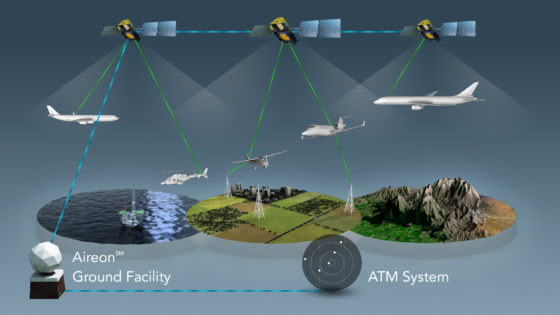Latest News

Aireon global space-based ADS-B diagram. Photo: Aireon
Aireon announced it has formally received control of the first Automatic Dependent Surveillance-Broadcast (ADS-B) payload hosted on an Iridium Next satellite. This is a major milestone on the path toward 100 percent global air traffic surveillance. Aireon now begins a rigorous, in-depth testing and validation process, verifying the capability of the ADS-B payloads. The company also announced that Thales has officially begun the testing and validation of the ADS-B data.
With the Aireon system now receiving initial air traffic information from its first orbiting satellites, Thales will independently validate the space-based ADS-B air traffic surveillance data. This collaboration will include an assessment of technical performance, defining requirements associated with utilization of the data safely and reliably, as well as determining the impact the service will have on existing maintenance and operational processes. The Memorandum of Understanding (MOU) was the first agreement signed between Aireon and an air traffic management automation platform provider.
“When we first turned on the payloads after they reached orbit, we received an unexpected surprise — aircraft were immediately being seen in real-time,” said Aireon CEO, Don Thoma. “We’ve already seen commercial aircraft, general aviation aircraft and helicopters, in oceanic and remote airspace that have never before had real-time surveillance. The real fun for us now begins as we take control and push the performance to see just what space-based ADS-B can do.”
In late January, the first “power-on” for the Aireon ADS-B payload was performed to validate launch survival and run a self-diagnostic systems check. During this systems check, Aireon did not expect to see any aircraft, however the payload antennas were active and the company detected150 ADS-B aircraft over multiple-passes with thousands of ADS-B messages received and decoded.
Aireon’s space-based ADS-B system will be operational in 2018, shortly after completion of the Iridium Next satellite constellation. The service will provide Air Navigation Service Providers (ANSPs) with global air traffic surveillance and airlines with real-time flight tracking. It is expected to help reduce fuel costs, increase safety, and enable more efficient flight paths.
SpaceX launched the first 10 Iridium Next satellites carrying the Aireon hosted-payloads into Low-Earth Orbit (LEO) from Vandenberg Air Force Base on a Falcon 9 rocket, on January 14. Seven additional SpaceX launches are scheduled to take place over the next 12 to 15 months, including the second launch now targeted for mid-June. In total, the operational constellation consists of 66 satellites, while the remaining nine launched will serve as on-orbit spares.
Get the latest Via Satellite news!
Subscribe Now